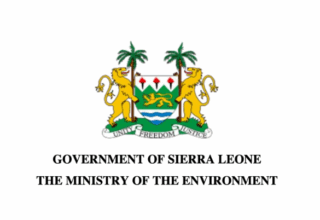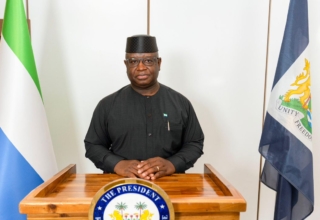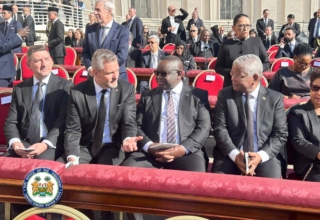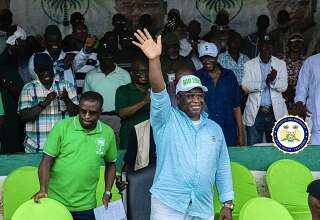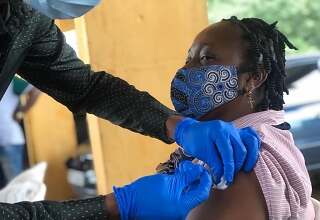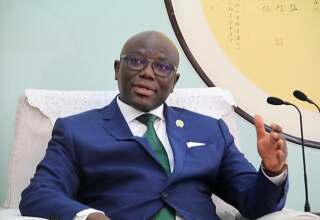
𝐁𝐲 𝐒𝐨𝐫𝐢𝐞 𝐅𝐨𝐟𝐚𝐧𝐚.
Sir Milton Margai of the SLPP served as Sierra Leone’s head of government from 1954 until his sudden demise in 1964. He served as the country’s first Prime Minister from 1961 until his death on 28th April, 1964.
His biggest legacy is the attainment of Independence from British colonial rule on 27th April, 1961. To date, Sir Milton Margai is still remembered for his selfless service in public life. He was the country’s first Protectorate trained Medical Doctor.
Sir Milton Margai was succeeded by his half-brother Sir Albert Margai. Albert Margai served as Prime Minister of Sierra Leone from 28th April, 1964 to 21st March, 1967.
Sir Albert Margai was the first Protectorate to qualify as an Attorney. He became known as ‘Albert of Africa’ for his big ideas.
Siaka Stevens of the APC served as Prime Minister of Sierra Leone from 1967 to 1971 and as President from 1971 to 1985. He decided to retire peacefully from public life due to a protracted failing health condition.
His biggest legacy could be found in the infrastructure sector. He built major roads and undertook major infrastructure projects such as the National Stadium initially named after him. He is still being remembered for all the good things he did for the country when he served both as Prime Minister and as President of Sierra Leone from 1967 to 1985.
Joseph Saidu Momoh became Siaka Stevens handpicked successor. He served as President of Sierra Leone from November 1985 to April 1992 when he was toppled in a military coup.
Momoh is still being remembered for returning the country to multi-party democracy in 1991. He served his country diligently in the Army and rose to the enviable rank of Major General.
Valentine Strasser became the Chairman of the military junta that overthrew the Momoh government in April 1992.
Captain Valentine Strasser inherited the civil war from his predecessor Joseph Saidu Momoh. He spent his entire time in office prosecuting the civil war. In 1992, he was the world’s youngest leader.
Sierra Leoneans still remember Valentine Strasser for leading a glorious revolution to topple the cleptocratic regime of Joseph Saidu Momoh.
Julius Maada Bio succeeded Valentine Strasser by overthrowing him in a bloodless palace coup on 16th January, 1996. He is credited with presiding over the 1996 multi party elections that saw the peaceful return of the country to civilian rule. He is also credited with initiating direct contact with the elusive RUF leader Foday Sankoh that led to substantive negotiations between the incoming government of Ahmad Tejan Kabbah and the RUF of Foday Sankoh. Brig. (Rtd) Julius Maada Bio left office peacefully in March 1996 and flew out of the country.
Ahmad Tejan Kabbah served as President of the Republic of Sierra Leone between 1996 and 2007. He inherited the civil war. As a civilian head of state, he ended the war and brought durable peace to Sierra Leone. Kabbah left office peacefully in 2007 after presiding over the peaceful transfer of power to an opposition leader. Ahmad Tejan Kabbah is credited with ending the civil war and bringing lasting peace to Sierra Leone.
Ernest Bai Koroma succeeded Ahmad Tejan Kabbah in September 2007. Koroma’s tenure witnessed an Iron Ore boom in the North of the country. He undertook major infrastructure projects especially in the roads sector. He did the Matotoka/Koidu road, and several township roads in especially the Northern Region where he hails from. Koroma is credited with the peaceful hand over of power to the main opposition SLPP presidential candidate, Julius Maada Bio on 4th April, 2018.
Julius Maada Bio returned to State House for the second time in April 2018. He has been in office since then. He was recently re-elected for a second and final five-year term.
During his first five years in office (2018 to 2023), Maada Bio undertook major projects like the Free Quality Education program, the free school feeding program and the construction of a state-of-the-art international airport at Lungi. He is building and/or replacing major bridges across the country, with support from donor partners especially the European Union. He has brought the US$420million ARISE IIP project including the SIZ-Koya Industrial Zone. He is building a brand new and the first University in Kono District. He is constructing a road linking Sierra Leone to Guinea through Kono district in the Eastern Region. He is building the Kailahun/Koindu Road. He has undertaken rural electrification across the country.
One of President Julius Maada Bio’s biggest and most important legacies when he leaves office in 2028 would be the ARISE IIP project including the Koya Industrial Zone and the return of the Passenger trains. The last passenger train service was terminated in Sierra Leone in 1974 under the leadership of President Siaka Stevens.
Great leaders are always remembered for their enduring legacies. President Bio should pursue the ARISE IIP project in all seriousness. When he leaves office in 2028, the world would remember him for the Koya Industrial Zone and the return of the passenger trains to Sierra Leone.
Tony Blair once said that, “Politics is about taking touch decisions, not dodging them’.
May common sense prevail!


